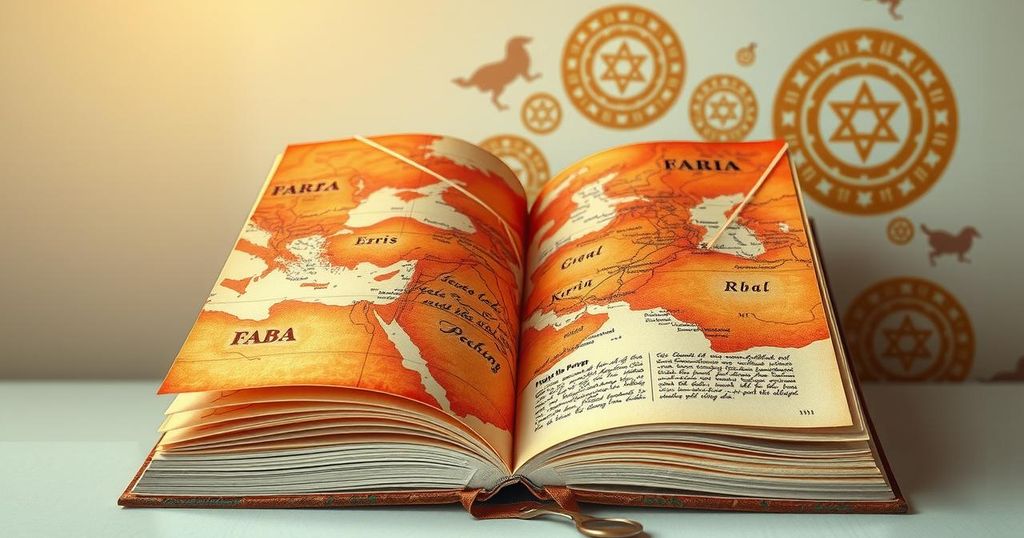World news
’ ESH, AFRICA, ANATOLIA, ARABIA, ASIA, BIEN PHU, CIVIL WAR, COLUMBIA, COLUMBIA UNIVERSITY PRESS, CONFLICT, DA, IRAN, JONATHAN WYRTZEN, LAWRENCE OF ARABIA, LIBYA, MANARA, MIDDLE EAST, MOROCCO, REFUGEE CRISIS, RIF REPUBLIC, TERRORISM, UNIVERSITY PRESS, WAR, WYRTZEN
Marisol Gonzalez
0 Comments
Revisiting the Middle East’s Role in World War I: A Review of Jonathan Wyrtzen’s Insights
Jonathan Wyrtzen’s “Worldmaking in the Long Great War” reexamines the Middle East’s pivotal role amid World War I, highlighting local struggles against colonial powers from 1911 to 1934. The book challenges prevalent historical narratives that portray the region passively, instead illustrating how indigenous movements shaped modern borders and political dynamics. Wyrtzen’s research demonstrates the enduring impacts of these struggles on contemporary Middle Eastern conflicts.
“Worldmaking in the Long Great War: How Local and Colonial Struggles Shaped the Modern Middle East,” authored by Jonathan Wyrtzen and published by Columbia University Press in 2022, delves into the significant yet often understated role of the Middle East during World War I. Wyrtzen contends that this tumultuous period presented unique opportunities for various futures within the region from 1911 to 1934. The author explores pivotal events such as the Rif Wars in Morocco and the Great Syrian Revolt, which challenge traditional narratives that portray the Middle East merely as a passive victim of European colonial ambitions.
The book examines the lasting influences of World War I on contemporary conflicts, specifically referencing incidents like Da’esh’s alteration of the Syrian-Iraqi border in relation to the Sykes-Picot Agreement. Wyrtzen highlights that indigenous movements had successfully resisted colonial forces long before the widely recognized victory at Dien Bien Phu, citing events such as the Senussi triumph in 1915 and the Arab resistance during the Rif Wars as instances of earlier successes.
Wyrtzen emphasizes the centrality of religious movements, such as the Sheikh Said Rebellion in Anatolia and the Senussi movement in Libya, in these anti-colonial struggles. His detailed examination of French colonialism in Syria offers insights frequently overlooked in English-language literature, while he effectively retells Ibn Saud’s consolidation of power in Saudi Arabia.
Potential expansion of the book could encompass more of the broader Middle East, including Somalia and Afghanistan, noting significant historical events such as Afghanistan’s Third Anglo-Afghan War and Hassan’s rebellion against British colonialism in Somalia, which deeply influenced local resistance movements.
By situating the Middle East at the center of World War I’s history, Wyrtzen aligns his work with other significant texts, notably Sean McMeekin’s “The Russian Origins of the First World War,” which argues Russia’s ambitions were pivotal in igniting the conflict. Wyrtzen’s research draws attention to lesser-known historical documents, revealing how local actors have crucially shaped the region’s modern borders and political dynamics, thereby challenging long-held beliefs about the period.
The book “Worldmaking in the Long Great War” addresses the often overlooked impact of World War I on the Middle East and seeks to reclaim its historical significance. Traditional narratives have typically marginalized this region’s experiences to highlight more prominent European conflicts. In recent years, renewed scholarly interest has emerged, shifting focus back to the Middle Eastern struggles and their implications on contemporary regional conflicts. Wyrtzen’s analysis provides a thorough examination of colonial interactions and local resistances during a pivotal era in Middle Eastern history.
In conclusion, Jonathan Wyrtzen’s “Worldmaking in the Long Great War” serves as an essential text for understanding the Middle East’s complex role during and after World War I. By highlighting indigenous resistance and the historical significance of various local struggles, the book challenges simplistic narratives about the region’s past. Wyrtzen’s work ultimately enriches our understanding of how historical events continue to shape modern Middle Eastern dynamics, marking it as a key text for scholars in colonial studies and Middle Eastern history.
Original Source: manaramagazine.org




Post Comment